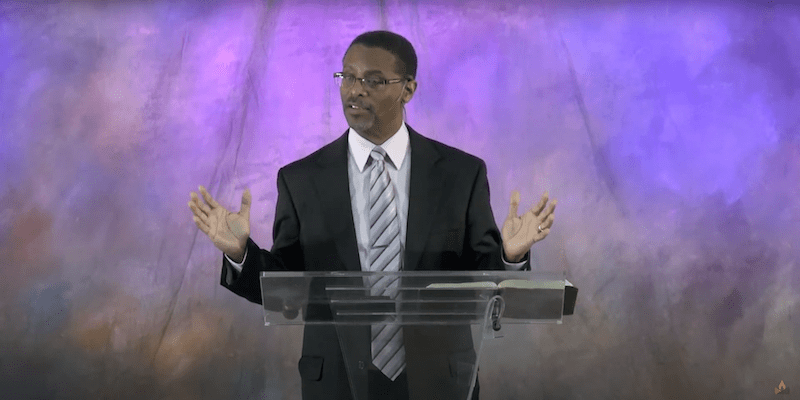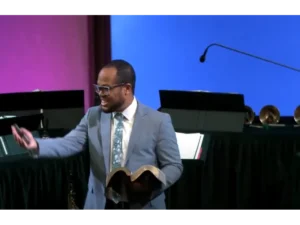If “Search Me” and “Wake Me” are dangerous prayers, “Break Me” takes it to a whole different level. It goes without saying that this third prayer is one nobody wants to pray, including me! But as we learned last Sabbath in part three of this series, there can be no Pentecost without Calvary.
Whether we like it or not, Covid-19 is breaking us. It has cracked our psyches in ways we couldn’t have imagined back in January. And it, along with other comfort-breaking events of 2020, has exposed cracks in our Christianity as troublesome as those discovered on the West Seattle bridge. And before that bridge will be useful again, it will have to be broken and rebuilt.
“Examine yourselves,” Paul said, “to see whether you are in the faith” 2 Cor. 13:5. Why? Because too many are in the church but not in the faith. While we shake our heads in perplexity wondering why God does not move in revival power on the church, Leonard Ravenhill writes, “He is wondering why we do not break! We wish He would bend low; He wishes we would break down.” Just like there can be no Pentecost without Calvary, there can be no breakthrough without a breakdown. Breakthrough begins at the altar of brokenness. And what’s on the altar is me and my raging love of self.
Rewind to Joel 2:28-29 for a stunning picture of what revival in the last days looks like. It’s what we long to see and experience. But don’t ignore the means God requires of us to secure the blessing. Those means are found in verses 12-17 of that same chapter—returning to God, self-denial, repentance, even anguish. The inescapable fact is that awakenings are preceded by breakings. Sadly, the other inescapable fact is that there are more people in anguish over the state of the economy and country than there are over the state of the church or that of our hearts.
Comfort cannot continue to be our first priority. Our buildings, our programs, our services and religious rituals, our rhetoric—none of that impresses God. What does impress Him? “The sacrifices of God are a broken spirit; a broken and contrite heart, O God, you will not despise.” Psalm 51:7
Psalm 51 is a Psalm of David, written after Nathan confronted him about his sin with Bathsheba. His song of repentance helps us understand brokenness. Rewind to verse 4: “Against you, you only, have I sinned and done what is evil in your sight.” To pray, “Lord, Break Me” is to get real about sin.
David’s sin was not just against Bathsheba and Uriah. It was against God. To Pray, “Lord Break Me” is to own our sin. No blaming or pointing fingers. David pleads with God to, “blot out my transgressions. Wash away all my iniquity and cleanse me from my sin.” (vs. 1-2)
A key to brokenness is humility. In order for God to use any of us, we have to be emptied of self. God has to break us of pride, self-confidence, self-sufficiency, and even of some things we don’t even know need to be removed from our lives. That’s why David prayed, “Surely you desire truth in the inner parts; you teach me wisdom in the inmost place…Create in me a pure heart, O God, and renew a steadfast spirit within me.” (Psalm 51:6, 10) No surface religion. David knows his issues run deep, so he asks for a deep working of the Holy Spirit to recreate his heart. Are we praying for the same?
Sometimes the brokenness comes not so much from sinfulness as from emptiness. We are broken to come to the end of ourselves.
Second example comes from Luke 22:19: “And he took bread, gave thanks and broke it, and gave it to them, saying, ‘This is my body given for you; do this in remembrance of me.’” Because Jesus’ body was broken, because his blood was poured out for us, we too should live daily for him, broken and poured out.”
Oswald Chambers writes, “If ever we are going to be made into wine, we will have to be crushed; you cannot drink grapes. Grapes become wine only when they have been squeezed.” How are you being squeezed right now, and, more importantly, is what is being squeezed out bitter or sweet? We are broken to serve freely.
Finally, there was the woman who came with the alabaster jar of expensive perfume. She broke the jar and poured it on Jesus’ head. (See Mark 14:3.) Though it represented a year’s wages, she broke the bank and gave it all to Jesus. When she broke the bottle, she burned her bridges. No going back. She poured out all the contents on Jesus, symbolizing that she would give him all of her life. To pray “Lord, break me,” is to say, “Lord, take all of me.” I’m holding nothing back. You can have it all. What is unbroken remains sealed in its container. There must be a breaking in order to benefit from and enjoy what’s inside.
Are we ready to pray this prayer? We are broken to worship fully; we are broken to serve freely; we are broken to repent deeply and humbly. True brokenness before God isn’t a one-time event. (See 1 Cor. 15:31.) It’s a daily choice to die to pride. To crucify lust. To destroy selfishness. Rather than living a life of ease, it’s a choice to live a life of faith. Jesus is looking for those who will live broken and spilled out for Him. Will you be one of these?
Pastor Randy Maxwell




